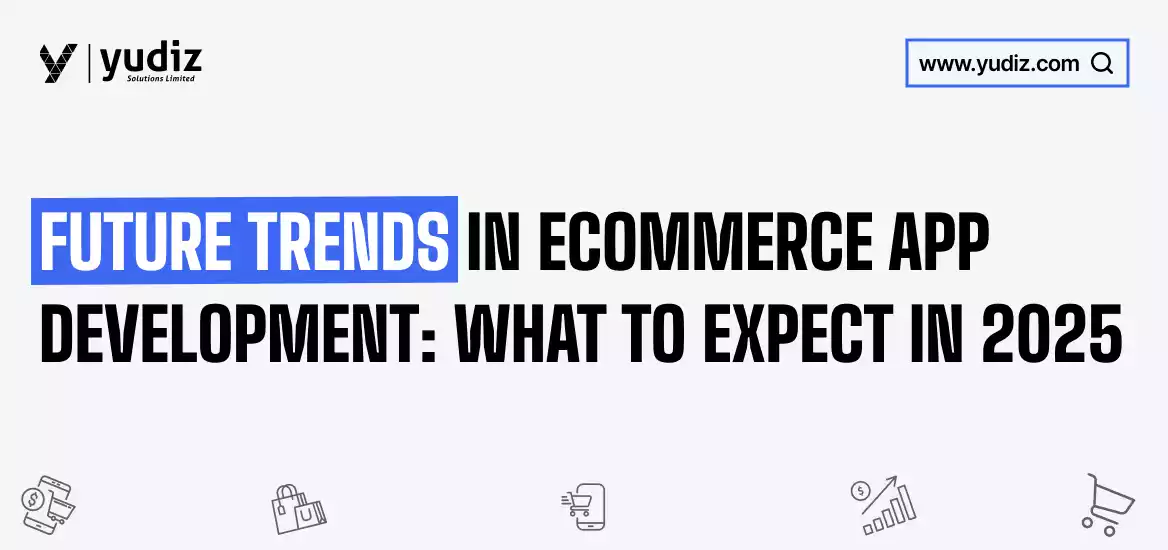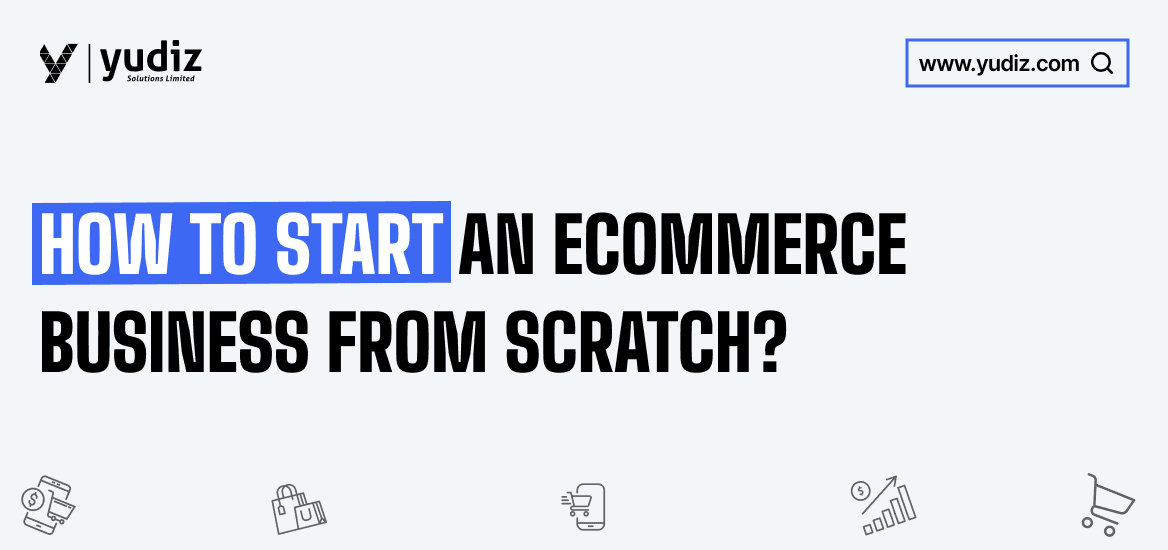Explained Simply26th March 2025
With the growth and innovation in the industry, e-commerce is entering into a new era globally. It increased by $USD 5.84 billion in 2023 and is expected to increase by USD 33.29 billion by 2032. The trends in ecommerce app development are expected to evolve rapidly by changing consumer behavior and meeting their expectations. The future of ecommerce app development is to be more in demand that gives intelligent and secured business solutions. Also, following the future trends of the ecommerce app, it will redefine businesses, increasing engagement among the users.
This article guides about the ecommerce app emerging technologies and also about the ecommerce app future trends. This also focuses on how the ecommerce app growth trends help to meet the user expectations and help to reshape the future of ecommerce app development. To navigate better with the ecommerce app development services, let us understand the top ecommerce app innovations 2025 here.
Top Trends in Ecommerce App Development

If we look into the current market scenario of the ecommerce industry, it is increasing tremendously, reflecting the growth of its demand. Businesses invest in development by considering the ecommerce app development cost and are looking to stay ahead of the competition with technology and innovation. From the traditional way of buying and selling, it has now peaked to integrating AI, AR, chatbots, and intelligent mobile shopping. Let us explore the Ecommerce app trends 2025
1. Secured Connection with Blockchain Technology
Security is the main concern during the ecommerce app development, as it needs a secured transaction during purchasing the product. Hence, integrating blockchain technology provides a decentralized and transparent way to do the transactions.
Impact of Blockchain on Ecommerce
- Secured Payment: Using cryptocurrencies, blockchain enables safe and secured transactions
- Transparency: Customers can track the origin of the product & do the authentication
- Smart Contracts: Implementing automated agreements once the predefined conditions are met.
There is an increase in the growth of online shopping using ecommerce, and hence, users are more concerned about data security and trust at the platform. In this case, there exists the integration of blockchain technology.
2. Voice Commerce or Voice Search – Turning the Volume High
Top voice assistants like Alexa & Google Assistant have made a tremendous impact by interacting easily with consumers on ecommerce platforms. This is one of the most implemented trends for ecommerce app development 2025.
Advantages of Voice Commerce
- Hands-Free Shopping: Using voice commands, it allows users to easily search and order for the products they like.
- Faster Process: It enables seamless and secure payment with a faster checkout process
- Ease of Access: It is beneficial for people with disabilities & also for users who prefer hands-free interaction
- Future Scope: Ecommerce app predictions 2025 show that businesses will integrate with this and enhance it with voice search optimization.
Also Read: 5 Ways an eCommerce Mobile App Development Company Can Boost Your Sales
3. Experiencing Shopping with AR VR
Ecommerce app technology trends have emerged with integrating AR and VR into online shopping. This helps in increasing the interactivity and engagement of users on the platform.
The trend of AR and VR with ecommerce platforms is filling the gap between the physical and digital world. The users can visualize the product in a real-time environment and can increase the chances of buying it.
Impact of AR and VR on Ecommerce
- Virtual Try: Before purchasing a product, consumers can have a virtual try, whether it is clothes, glasses, shoes, etc.
- 3D Visualization: Users can view the product in a more realistic view with 3D. This helps in reducing the product returning rates.
- Experiencing a Physical Store: Using AR and VR, creating virtual showrooms makes customers feel like exploring a physical store.
4. Integrating AI(Artificial Intelligence) & ML (Machine Learning)
AI has transformed the ecommerce industry to the peak, allowing brands to automate the products or businesses. Integrating AI & ML is one of the top trends in ecommerce app development. It provides recommendations to the users as per their search behavior.
AI & ML with Ecommerce App
- Personalized Shopping: AI-driven recommendations give a personalized shopping experience to users as per their preferences.
- Real-Time Support with Chatbots: AI-powered chatbots offer quick customer support that, in turn, enhances the engagement of the users
- Improves Sales Forecasting: With the help of predictive analytics, AI helps businesses understand customers’ needs, optimize inventory, and increase sales.
Also Read: How Much Does It Cost to Develop a High-Quality eCommerce App
5. Adapting Digital Wallet & Cryptocurrency
Apart from making online payments, the trend of digital wallet & cryptocurrency is increasing with secured payment systems.
- Future of Implementing Digital Payments
- Bitcoin and Altcoins: There will be businesses that will be accepting cryptocurrency payments
- Biometric Authentication: For secured transactions, it is important to have biometric authentication. This can be done by fingerprint or facial recognition.
- Contactless Payment: Making contactless payments at ease with QR codes and NFC payments
6. Social Commerce Integration
For online shopping, social media platforms are now becoming a boom. The trend of integrating with social commerce with well-known social media platforms like Instagram, Facebook, etc, is more in demand. This helps to increase user engagement to the ecommerce platform.
Benefits of Integrating Social Commerce
- In-App Purchases: Users can buy the products using social media platforms without leaving it
- Influencer Marketing: Collaborate with Influencers to boost sales
- Live Stream Shopping: The emerging trend in ecommerce app development is live-stream shopping. This allows users to buy products during live sessions.
Also Read: How Much Does It Cost To Develop An E-commerce Website?
7. Subscription-Based eCommerce Models
Whether it is clothing, food, or rental companies, subscription-based models have increased and are the future of ecommerce app development. It creates a continuous revenue for an ecommerce platform, also increasing the customer’s loyalty. With subscription models, customers can access discounts or early offers that are profitable to businesses as well.
Future of Subscription-Based Ecommerce Models
Predictable Revenue: Businesses can predict with a fixed monthly or yearly revenue
Customer Retention: Chances of increase in customer retention to loyal brands or businesses offering best services.
Personalized Experience: It can provide a personalized experience to users who opt for a subscription.
Build Your Ecommerce App!

Conclusion
With the new emerging technologies, there is an increase in the ecommerce app’s future features. This gives a new way to customers’ shopping experience following the top trends in the ecommerce app development. The integration of AI & ML and livestream shopping have redefined the e-commerce business, helping to connect more customers globally.
Also, other ecommerce trends like voice commerce, social commerce, and many more are reshaping the ecommerce business. To stay ahead of the competition, businesses need to adapt these innovations to their ecommerce business and enhance their user experience and engagement.
Frequently Asked Questions
The top trends in ecommerce app development for 2025 include AI integration, a real-time shopping experience with AR/VR, blockchain for security, voice commerce, social commerce, etc.
There are different ways in which AI will shape the future of ecommerce apps in 2025. Some of them include AI chatbots and smart recommendations, automated marketing strategies, and optimized inventory management systems.
Using AR/VR in ecommerce enables customers to have virtual try-ons, 3D product visualization, and an outstanding shopping experience that increases customer engagement.
Voice commerce will have a great impact on ecommerce apps in 2025. This simplifies shopping, hands-free shopping, secured authentication, and transactions.
The challenges of adopting future ecommerce app trends in 2025 includes high development costs, data privacy concerns, integration complexities, and the need for continuous technological adaptation.
Businesses can implement ecommerce app trends in 2025 by investing in AI and optimizing apps for mobile devices and voice search. Enhancing security with blockchain integration and providing an engaging experience with AR/VR integration.



















